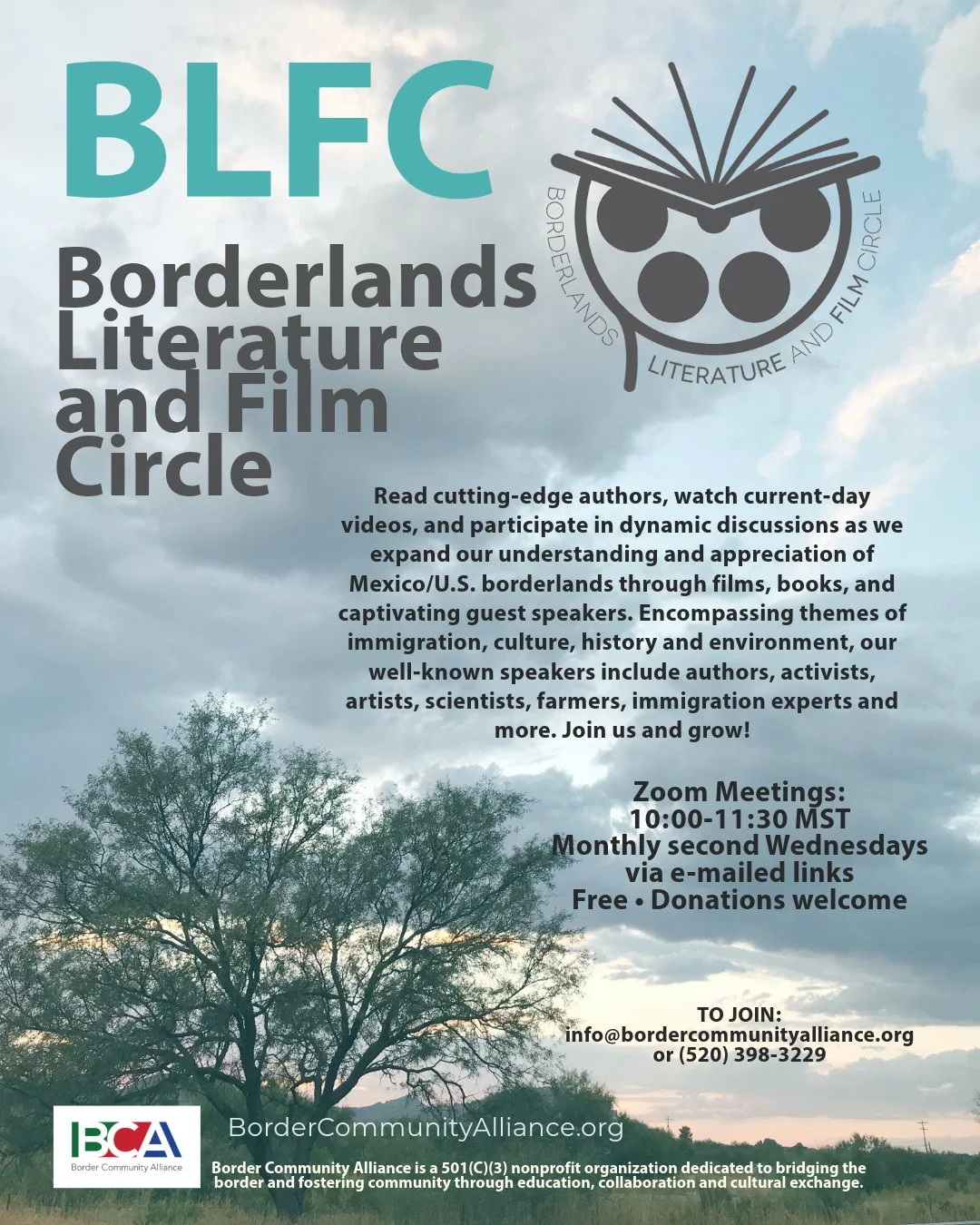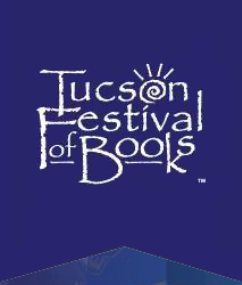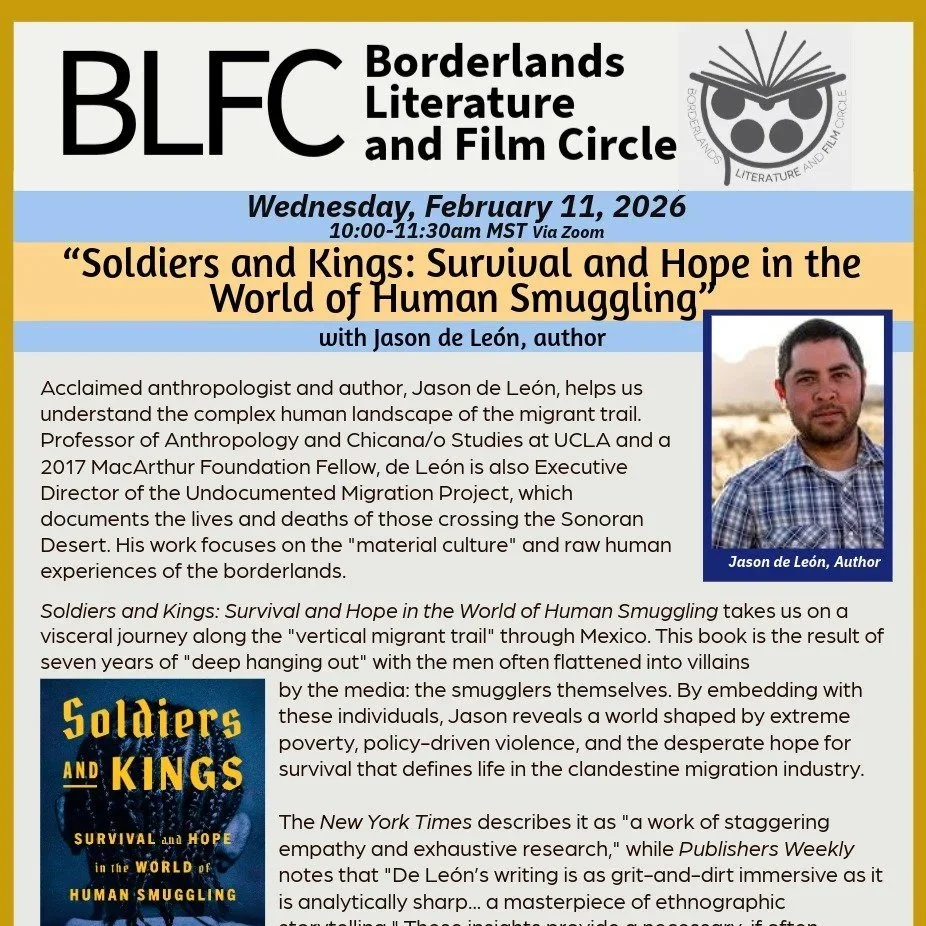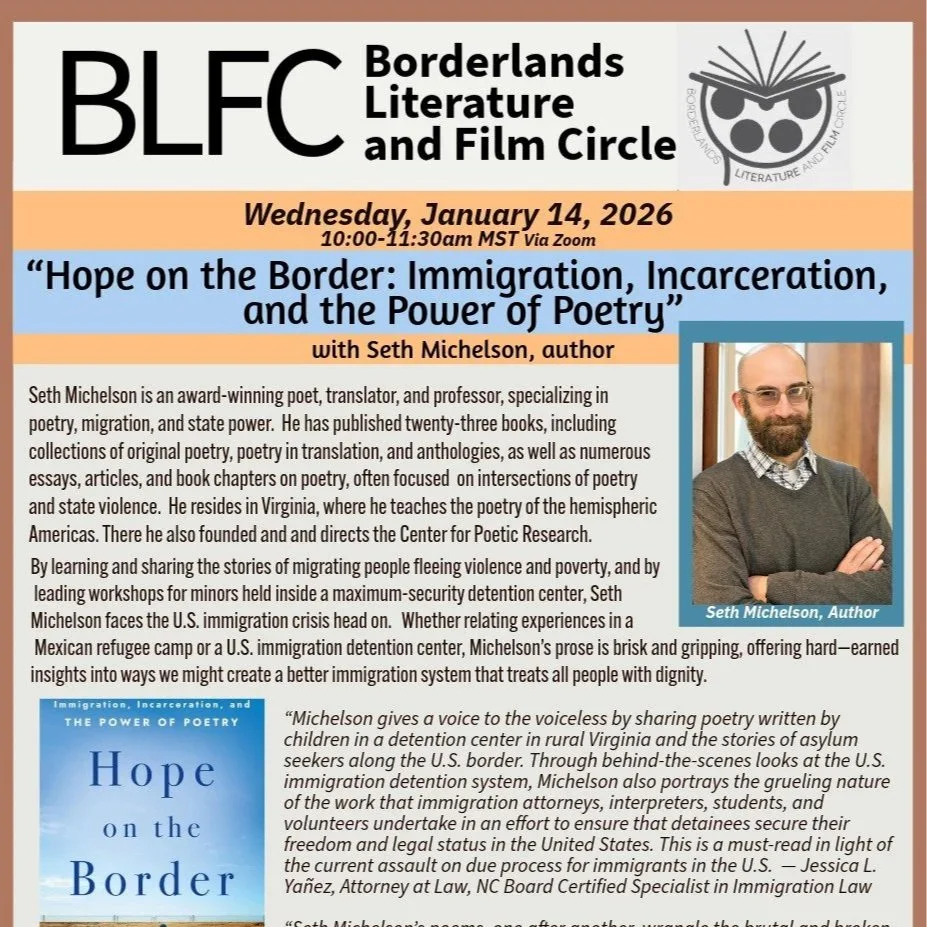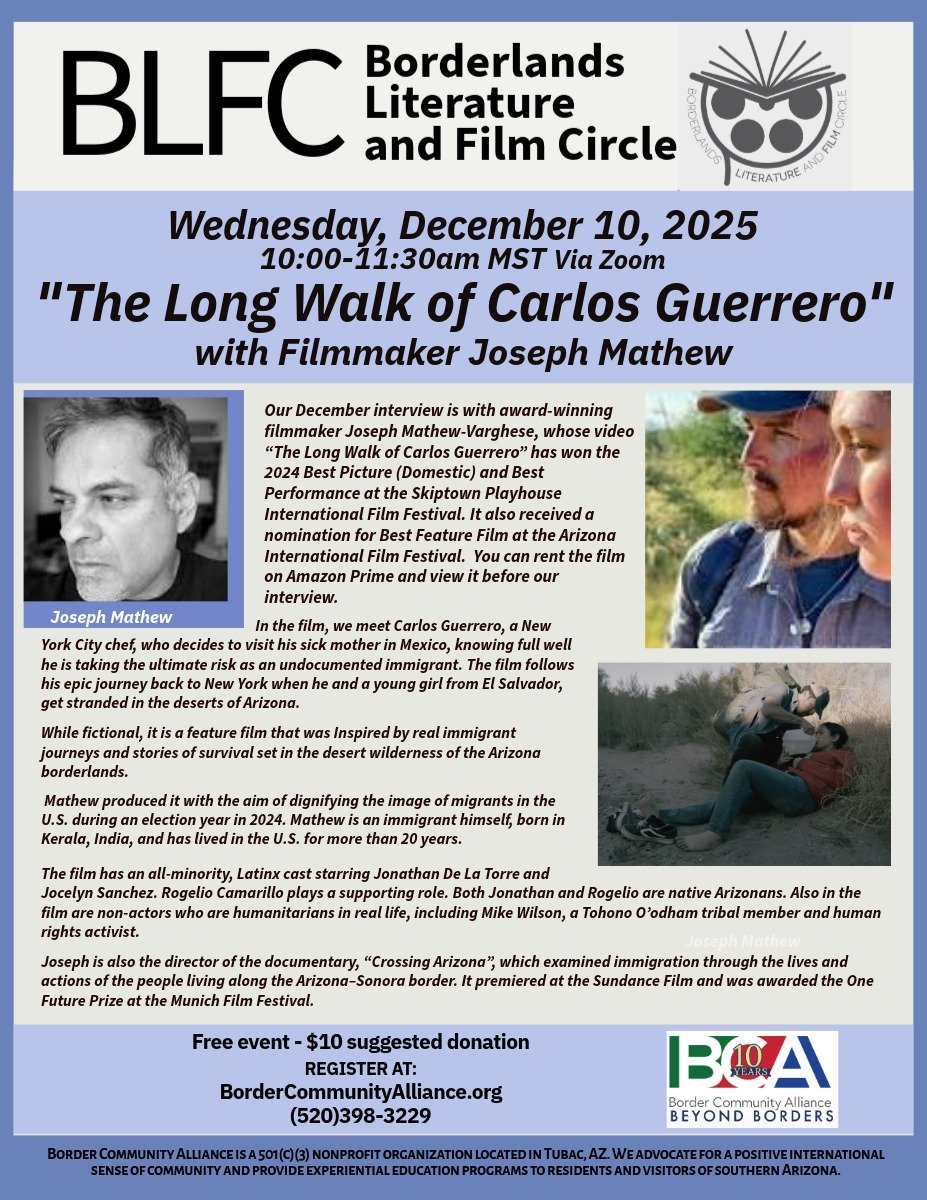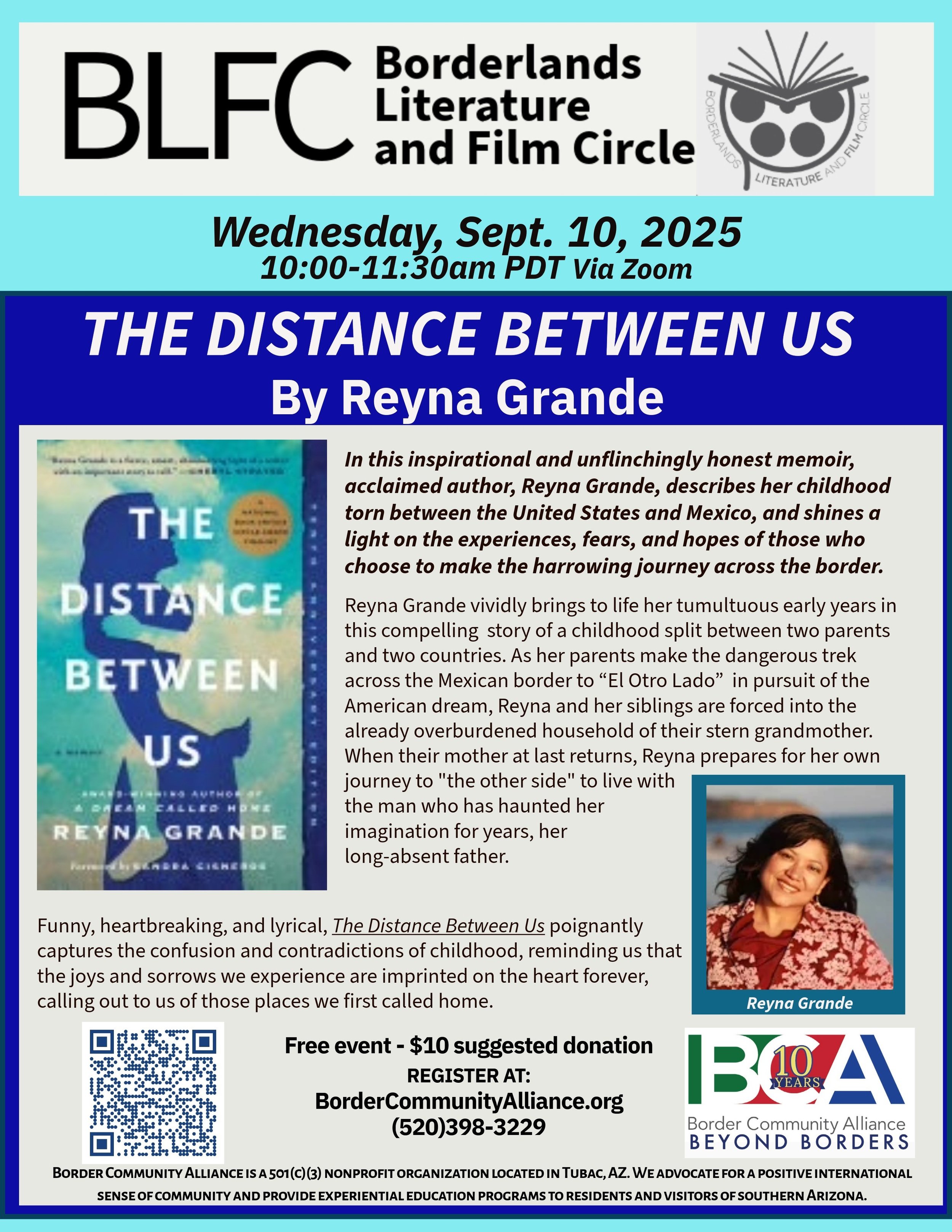Borderlands Literature and Film Circle
The Borderlands Literature and Film Circle (BLFC) is a monthly event on Zoom. Read cutting-edge authors, watch films, and participate in dynamic discussions as we expand our understanding of the Mexico-U.S. borderlands through films, books, and captivating guest speakers.
Join us on the second Wednesday of each month from 10-11:30am MST! Registration is free, $10 suggested donation.
Scroll down to register for our upcoming BLFC. You can also view our archive of recordings with dozens of authors and filmmakers.
coming up
Saturday, March 14 & Sunday, March 15
Tucson Festival of Books
March of every year is not scheduled for a meeting, as BLFC sponsors a BCA booth at the Tucson Festival of Books. Please plan to attend! Our booth is #320, near the Nuestras Raices stage. You’ll find a map and lots more info on this TFOB website: https://tucsonfestivalofbooks.org/.
Wednesday, April 8, 10-11:30am
Jack Dash and Luke Takata, “Atascosa Borderlands Multi-Media Visual Storytelling Project”
Naturalist and writer Jack Dash and documentary photographer Luke Takata will share insights from this long-term visual storytelling project that archives the remote Arizona-Sonora borderlands through photography and oral history: https://www.atascosaborderlands.com/.
Wednesday, May 13, 10-11:30am
Carolyn Niethammer, "A Desert Feast: Celebrating Tucson's Culinary Heritage"
This discussion will explore the rich history and cultural significance of the traditional foods that have shaped the Sonoran Desert's culinary identity.
Wednesday, June 10, 10-11:30am
Daisy Hernández, "Citizenship: Notes on an American Myth"
Hernández explores our country’s ongoing debate about who belongs, and provides fresh ways of thinking about citizenship, exploring the challenging questions of belonging, identity, and the intricate immigrant experience in America.
archive
February 11, 2026
Jason de León, “Soldiers and Kings: Survival and Hope in the World of Human Smuggling”
Revisit our conversation with anthropologist and author Jason de León. We discuss his book “Soldiers and Kings: Survival and Hope in the World of Human Smuggling,” which tells about the lives of with the men often flattened into villains by the media: the smugglers themselves.
January 14, 2026
Seth Michelson, “Hope on the Border: Immigration, Incarceration, and the Power of Poetry”
Revisit our conversation with poet, translator and professor Seth Michelson. We discuss his books “Dreaming America” and “Hope on the Border,” which include poems written by minors incarcerated in the maximum-security detention center where Michelson led poetry workshops.
December 10, 2025
Joseph Mathew-Varghese, “The Long Walk of Carlos Guerrero”
Revisit our conversation with filmmaker Joseph Mathew-Varghese. We discuss his award-winning film “The Long Walk of Carlos Guerrero,” which was inspired by real immigrant journeys and stories of survival in the desert wilderness of the Arizona borderlands.
November 12, 2025
Elizabeth Shakman Hurd, “Heaven Has a Wall: Religion, Borders, and the Global United States”
Revisit our conversation with academic Elizabeth Shakman Hurd. We discuss her book, “Heaven Has a Wall,” which explores how national conversations about the border have taken a religious turn.
September 10, 2025
Reyna Grande, “The Distance Between Us”
Revisit our conversation with author Reyna Grande. We discuss her memoir “The Distance Between Us,” which describes her childhood torn between the United States and Mexico.
View the rest of the BLFC archive on Vimeo:
2025
Tim Z. Hernandez, author of “All They Will Call You” (August 13, 2025)
David Damian & Gale Hall, authors of “El Oz” and “Lili’s Quilt” (July 9, 2025)
Barbara Sostaita, author of “Sanctuary Everywhere” (April 9, 2025)
Gary Paul Nabhan, author of “Against the American Grain” (January 8, 2025)
2024
Melani Martinez, author of “The Molino: A Memoir” (December 11, 2024)
Sarah Towle, author of “Crossing the Line: Finding America in the Borderlands” (October 9, 2024)
Jared Orsi, author of "Recovering the Lost History and Culture of Quitobaquito" (September 11, 2024)
Dora Rodriguez, author of “On Migration and Amnesty” (July 10, 2024)
Renata Golden, author of “Mountain Time: A Field Guide to Astonishment” (May 8, 2024)
John B Washington, author of “The Case for Open Borders” (February 14, 2024)
2023
Henry Barajas, “La Voz de M.A.Y.O.: Tato Rambo” (December 13, 2023)
Alejandra Oliva, “Rivermouth: A Chronicle of Language, Faith, and Migration” (November 8, 2023)
Seth Schermerhorn, Bernard Siquieros, Regina Siquieros, “Pilgrimage to Magdalena” (October 11, 2023)
Tom Zoellner, “Rim to River: Looking Into the Heart of Arizona” (August 9, 2023)
Lydia Otero, “In the Shadow of the Freeway: Growing Up Brown and Queer” (May 10, 2023)
Gary Paul Nabhan, “The Nature of Desert Nature” (February 8, 2023)
2022
Dr. Toni Munoz-Hunt discusses the topic of Bordercanos (August 10, 2022)
Athena Swentzell Steen discusses the topic of Southwest Desert-Adapted Architecture (July 13, 2022)
Daniel Cooper Alarcon discusses the topic of the history and mythology of Aztlan (June 8, 2022)
Todd Miller, “Build Bridges, Not Walls: A Journey to a World Without Borders” (February 9, 2022)
2021
Jeff Babson, Sky Island Tours (November 11, 2022)
Roxanne Swentzell and Patricia Perea, “The Pueblo Food Experience Cookbook: Whole Foods of our Ancestors” (October 13, 2021)
Gary Paul Nabhan, “Food from the Radical Center: Healing Our Land and Communities” (September 8, 2021)
Alberto Rios, “The Good Map of All Things” (July 14, 2021)
David Owens, “Where the Water Goes” and Craig Childs, “The Secret Knowledge of Water” (June 9, 2021)
Janya Burn, “Cloak and Jaguar: Following a Cat from Desert to Courtroom” (April 14, 2021)
Robert C. West, “Sonora: Its Geographical Personality,” Thomas E. Sheridan, “Where the Dove Calls,” Padre Kino documentary, “Favores Celestiales” (March 10, 2021)
Rita and Francisco Cantu, “The Line Becomes a River” (January 13, 2021)
2020
Jeffrey Schulze, “Are We Not Foreigners Here? Nationalism in the US-Mexico Borderlands” and film, “Sonora” (November 11, 2020)
Lawrence Taylor, “Tales from the Desert Borderland” and film, “El Mar La Mar” (October 14, 2020)
Rosayra Pablo Cruz and Julie S. Collazo, “The Book of Rosy: A Mother’s Story of Separation at the Border” and film, “Human Flow” (September 9, 2020)
César Cuauhtémoc García Hernández, “Migration to Prison: America’s Obsession with Locking Up Immigrants” (August 12, 2020)
Film, “Sin Nombre” (July 8, 2020)

